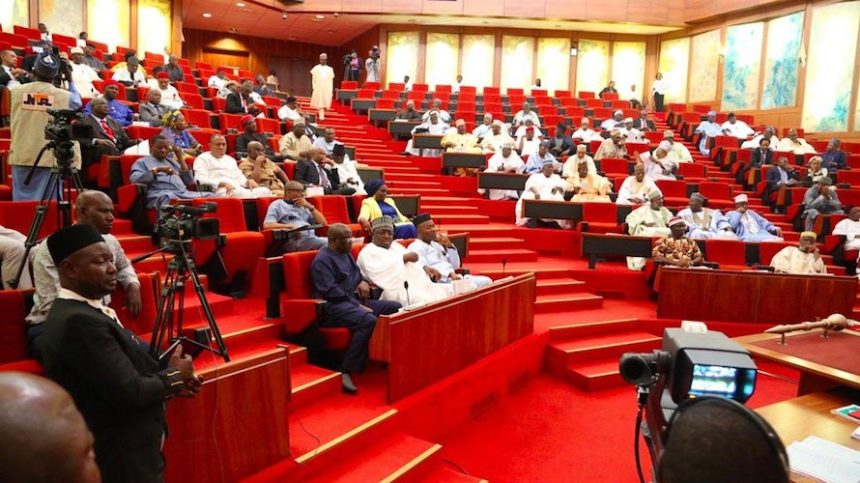[ad_1]
Udora Orizu writes that members of the Senate, last week reviewed the Copyright Act 2004 to make it an offence to broadcast any digital or online work of a performer without first obtaining his or her consent
The Senate last week reviewed the Copyright Act 2004 to make it an offence to broadcast any digital or online work of a performer without first obtaining their consent. The review was aimed at strengthening the provision of policy and legal framework for the effective regulation, protection and administration of copyright in line with global best practices.
The primary function of Copyright under the law is to protect from annexation the fruits of a person’s intellectual work. In Nigeria, the law which regulates this protection is the Copyright Act, Cap C28 LFN 2004. The governing body in charge of copyright is the Nigerian Copyright Commission (NCC). The commission is responsible for all matters affecting copyright in Nigeria as provided for in this Act, monitoring and supervising Nigeria’s position in relation to international convention and advise Government therein, advising and regulating conditions for the conclusion of bilateral and multilateral agreements between Nigeria and any other country, enlightening and informing the public on matters relating to copyright and maintaining an effective data bank on authors and their works.
Under the Act, Section 1 provides that the works that are eligible for copyright protection are literary works, musical works, artistic works, cinematograph works and sound recording.
Section 11 provides that the owner of a copyright has the right to claim authorship of his work, object and seek relief in connection with any distortion and mutilation or any other modification of his or her work.
However, since the beginning of the 20th century, the world has witnessed astronomical advancement in scientific and technological innovations which has led many thinkers to term this civilisation as ‘the jet age’. While this technological advancement has had its good impact on the world, it has however disrupted traditional modes of protecting intellectual property.
In Nigeria, despite the Copyright Act which protects intellectual property including digital innovations, the country remains one of the largest piracy destination in the world. These technological shortcomings have made it possible for infringers of digital inventions to make use of the technology with impunity, plagiarize and therefore making it impossible for the Copyright Act to live up to its mandate.
National Assembly Reviews Law
Members of the Senate, identifying the inadequacies making it impossible for the already existing Act to accord adequate protection of intellectual property, due to digital inventions in the country, amended the law.
With the amendment, the lawmakers, sought to strengthen the provision of policy and legal framework by making it an offence to broadcast any digital or online work of a performer without first obtaining their consent. The bill, when it is signed into law, would make the broadcasting or duplication of any online audiovisual work without the consent of the performer an infringement. These include audio or visual works by a performer posted on Facebook, Instagram, TikTok, Twitter or any other online platforms.
The proposed legislation, titled, ‘A Bill for an Act to Repeal the Copyright Act CAP LFN 2004 and to Re-enact the Copyright Act 2022,’ was sponsored by Senator Mukhail Abiru.
The passage of the bill followed the consideration of a report by the Joint Committee on Trade and Investment; and Judiciary, Human Rights and Legal Matters.
Co-Chair of the Joint Committee, Senator Saidu Ahmed Alkali (Gombe North), in his presentation, said the bill essentially seeks to strengthen the copyright regime in Nigeria to enhance the competitiveness of its creative industries in a digital and knowledge-based global economy.
According to the lawmaker, the re-enactment of the bill would effectively protect the rights of authors to ensure just rewards and recognition for their intellectual efforts.
He, however, stated that the legislation would also provide appropriate limitation and exceptions to guarantee access to creative works, encourage cultural interchange and advance public welfare.
He explained that when signed into law by the president, the new law would facilitate Nigeria’s compliance with obligations arising from relevant international copyright treaties and enhance the capacities of the Nigerian Copyright Commission for effective administration and enforcements of the provisions of the a copyright Act.
He noted that the bill seeks to align Nigeria’s copyright law to be in line with relevant international treaties, including the World Trade Organisation (WTO) Agreement on Trade Related Aspects of Intellectual Property Rights (TRIPS).
He said: “Piracy of Nigerian creative works has devastated businesses, harmed consumers and acted as disincentive to foreign direct investment in relevant sectors. The proposed legislation makes online/digital reproduction an infringement as well as properly defines copy to accommodate transient or non-permanent copy that are obtainable online.”
He added that the bill also provides for new rights of remuneration for performers in respect of audiovisual works.
According to the draft bill, Clause 65 states that, “in the absence of express agreement to the contrary, a performer’s consent to the broadcasting of his performance shall be deemed to include his consent to an authorised rebroadcasting of his performance, the fixation of his performance for broadcasting purposes and the reproduction for broadcasting purposes of such fixation.”
Clause 73 further provides for a fine of not less than N100,000 for an individual or to imprisonment for a term of not less than one year or both for an individual; and a fine of not less than N2 million naira where criminal liability arises in respect of infringement of performer’s rights.
[ad_2]
Source link










